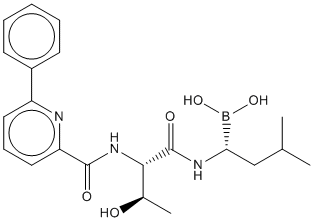All AbMole products are for research use only, cannot be used for human consumption.

Delanzomib (CEP-18770) is a potent chymotrypsin-like proteasome inhibitor with an IC50 of 3.8 nM. Delanzomib (CEP-18770) prevents the proliferation of several tumor cell lines, such as A2780 ovarian cancer cells, PC3 prostate cancer, H460, LoVo colon cancer, RPMI8226 multiple myeloma cancer and HS-Sultan anaplastic non-Hodgkin lymphoma with IC50 of 13.7, 22.2, 34.2 11.3, 5.6 and 8.2 nM, respectively. The IC50 values of Delanzomib (CEP-18770) are similar to those of bortezomib, with the chymotryptic and caspase-like activities being inhibited at low-nanomolar concentrations. Delanzomib (CEP-18770) blocks the ubiquitin-proteasome pathway in several MM and in the chronic myelogenous leukemia cell line, K562. Delanzomib (CEP-18770) gives rise to an accumulation of ubiquitinated proteins over 4 to 8 hours with a profile similar to that observed after bortezomib treatment.Delanzomib (CEP-18770) completely blocks the degradation of IκBα. Delanzomib (CEP-18770) markedly decreases high levels of NF-κB activity in both RPMI-8226 and U266 cells. The time- and concentration-dependent suppression of NF-kB DNA-binding activity in MM cell lines by Delanzomib (CEP-18770) leads to a decrease of several NF-κB-modulated genes mediating the growth and survival of tumor cells including IkBα itself, the X-chromosome-linked inhibitor-of-apoptosis protein (XIAP), the pro-inflammatory cytokines TNF-α and interleukin-1β (IL-1β), the intracellular adhesion molecule (ICAM1), and the pro-angiogeneic factor vascular endothelial growth factor. The proapoptotic activity of Delanzomib (CEP-18770) against MM is not limited solely to tumor-derived MM cell lines, but extends to primary MM explants from relapsed or refractory patients including those previously treated with bortezomib. In addition, the combination of Delanzomib (CEP-18770) with melphalan or bortezomib generates synergistic prevention of MM cell viability in vitro. Delanzomib (CEP-18770) reveals sustained and dose-related relative tumor weight inhibition. Delanzomib (CEP-18770) leads to dose-related induction of complete tumor regressions, as compared with bortezomib treatment, which results in a 50% incidence of CR at its maximally tolerated dose (MTD) of 1.2 mg/kg intravenously.In contrast to bortezomib, Delanzomib (CEP-18770) reveals dose-related increases in the incidence of tumor-free mice by the completion of these studies (120 days after tumor transplantation). Oral administration of Delanzomib (CEP-18770) yields a marked decrease of tumor weight and notable dose-related incidence of complete tumor regression with minimal changes in animal body weight over the course of 120 day studies. Relative to bortezomib, equiactive doses of Delanzomib (CEP-18770) reveals a greater and more sustained dose-related inhibition of tumor proteasome activity, corresponding temporally with maximum induction of caspase-3 and 7 activity.The maximum apoptotic signal is 2.5 fold greater for Delanzomib (CEP-18770) versus bortezomib.
| Cell Experiment | |
|---|---|
| Cell lines | HMEC and TEC cells |
| Preparation method | Seeding HMEC and TEC cells into 24-well plates at a density of 104 cells/well in DMEM supplemented with 5% FCS. After incubation with proteasome inhibitors (48 hours), cells are washed, air dried, and stained with crystal violet as described. In duplicate samples,cell number is determined on the basis of a standard curve obtained with known cell numbers. All experiments are performed in triplicate. In vitro formation of capillary-like structures is studied on cells (4 × 104 cells/well in DMEM supplemented with 5% FCS. After incubation with proteasome inhibitors (48 hours), washing cells (cells/well in 24-well plates) and seeding onto Matrigel-coated wells in DMEM containing 0.25% BSA. HMEC and TEC cells (5 × 103 per well), suspended in 200 μL DMEM with 5% FCS (positive control), serum-free medium (negative control), are layered onto the Matrigel surface in the presence or absence of proteasome inhibitor CEP-18770. Cells are observed with a inverted microscope and experimental results are then recorded after a 6-hour incubation at 37 °C. Data is analyzed, as the mean (× 1 SD) of total length of capillary-like structures, by the Micro-Image system and is expressed as mm/field by the computer analysis system in 5 different fields at 100 × magnification in duplicated wells for 4 different experiments. |
| Concentrations | 0-100 nM |
| Incubation time | 6 hours |
| Animal Experiment | |
|---|---|
| Animal models | Human MM RPMI 8226 subcutaneous xenograft model in SCID mice |
| Formulation | In a solution of 3% DMSO |
| Dosages | From 1.5 to 4 mg/kg, twice for 7 days to 4 weeks. |
| Administration | Intravenously |
| Molecular Weight | 413.28 |
| Formula | C21H28BN3O5 |
| CAS Number | 847499-27-8 |
| Solubility (25°C) | DMSO 73 mg/mL |
| Storage |
Powder -20°C 3 years ; 4°C 2 years In solvent -80°C 6 months ; -20°C 1 month |
| Related Proteasome Products |
|---|
| Proteasome inhibitor IX
Proteasome inhibitor IX (PS-IX; AM114) is a Chalcone derivative and a chymotrypsin-like activity of the 20S proteasome inhibitor with an IC50 value of ~1 μM. |
| NIC-0102
NIC-0102 is an orally potent proteasome inhibitor (pIC50=7.55) that specifically inhibits NLRP3 inflammasome activation.NIC-0102 showed potent anti-inflammatory effects in vivo in a DSS-induced ulcerative colitis model. In addition, NIC-0102 inhibited the production of pro-IL-1β. |
| Ac-WLA-AMC
Ac-WLA-AMC is a specific 20S constitutive proteasome β5 fluorogenic substrate. |
| Ac-Nle-Pro-Nle-Asp-AMC
Ac-Nle-Pro-Nle-Asp-AMC is a specific substrate for 26S proteasome. |
| PR-39
PR-39, a natural proline- and arginine-rich antibacterial peptide, is a noncompetitive, reversible and allosteric proteasome inhibitor. |
All AbMole products are for research use only, cannot be used for human consumption or veterinary use. We do not provide products or services to individuals. Please comply with the intended use and do not use AbMole products for any other purpose.


Products are for research use only. Not for human use. We do not sell to patients.
© Copyright 2010-2024 AbMole BioScience. All Rights Reserved.
